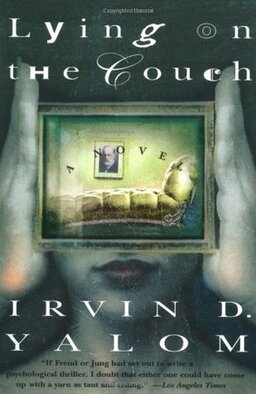Lying on the Couch by Irvin D Yalom
At the start, however, both men are practising more ethically than Seymour Trotter, who presents Ernest with an almost-convincing rationale for his having had sex with a patient: a disturbing end to an illustrious career. Ernest thinks himself immune from temptation but, tested by a new patient on a mission to discredit him, he comes close to breaking the taboo.
Given the frequency with which fictional therapists violate therapeutic boundaries, it was fascinating to explore this topic with a novelist who is also a renowned psychotherapist himself. Addressing the issue from the points of view of both therapists and patients, lying or otherwise, Yalom mines the ambiguities between yes and no. With multiple characters, each with rich histories, settings and relationships, I did wonder, occasionally, in the early chapters, where this was going, but persistence paid off.
The narrative zooms out from the initial focus on therapists exploiting patients sexually (even when they perceive it to be the other way around) into the wider issue of whose needs are being met in the therapeutic pairing. If a therapist loves a role in which their purpose is to be used, could they be doing something wrong?
Both Marshal and Ernest risk coming a cropper, not through incompetence but through a denial of their own vulnerability and their need for a third perspective to help them step back. Ernest abandons supervision at the point he most needs it, although he does sound out a therapist friend. Marshal’s lengthy experience and high status in the profession, along with his scorn for his wife’s pursuit of an ‘inferior’ therapy isolates him. For both men, grandiosity could ruin them, but Marshal has further to fall.
It’s a great novel for learning about the complex dynamics of psychotherapy, as well as an absorbing read. I loved the dance of continuing role reversals, and the clever and witty denouement is superb.
If you’re wondering about the title, the therapists do have a couch in their consulting rooms, but we aren’t shown any patients lying down. Instead we’re shown lying in the sense of deception, some of it deliberate, but much more lethal are the lies we tell ourselves. Freedom from which is one benefit of therapy, but it can only be partial, and therapists themselves are not exempt.
Portnoy’s Complaint by Philip Roth
I wouldn’t normally try to review a novel I didn’t finish, but this one requires adding to my fictional therapists list. And, boy, did I sympathise with that fictional therapist sitting silently as the novel’s antihero vomits his sexual history and hang-ups, stereotypically laid at his parents’ door. (Admittedly, they were pretty screwed up and over-controlling, his mother especially flipping between arbitrary punishment and smothering love.)
The big joke is that the therapist says nothing until the punchline at the end. But he – was this invisible doctor a he? – could’ve have served his client better, and made the novel more readable, if he’d occasionally chipped in.
I don’t care if I missed the point of this much-lauded novel. I gave it an entire evening I’ll never get back. Then, as if to clean my palate, I picked up a novel by a woman of colour which, of course, proved to be the better read.























 RSS Feed
RSS Feed





















